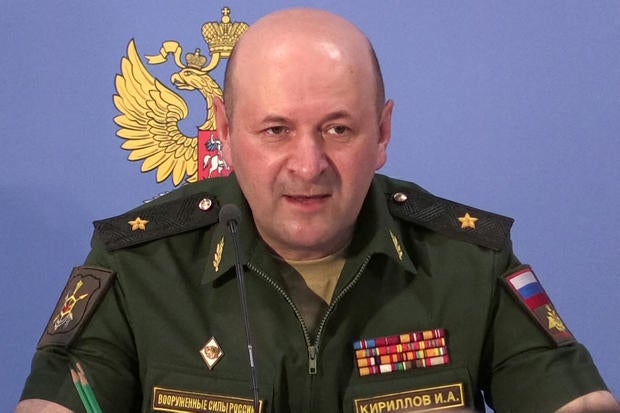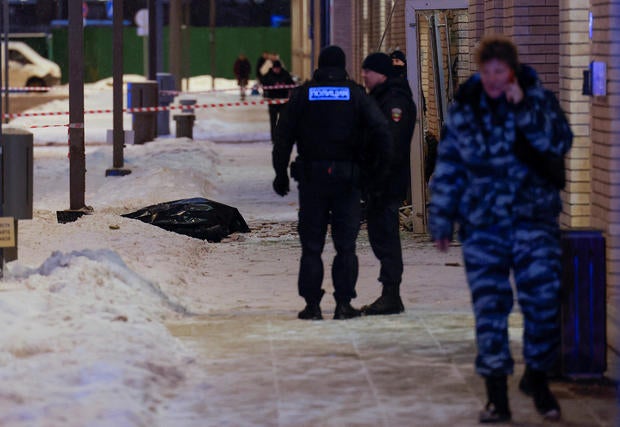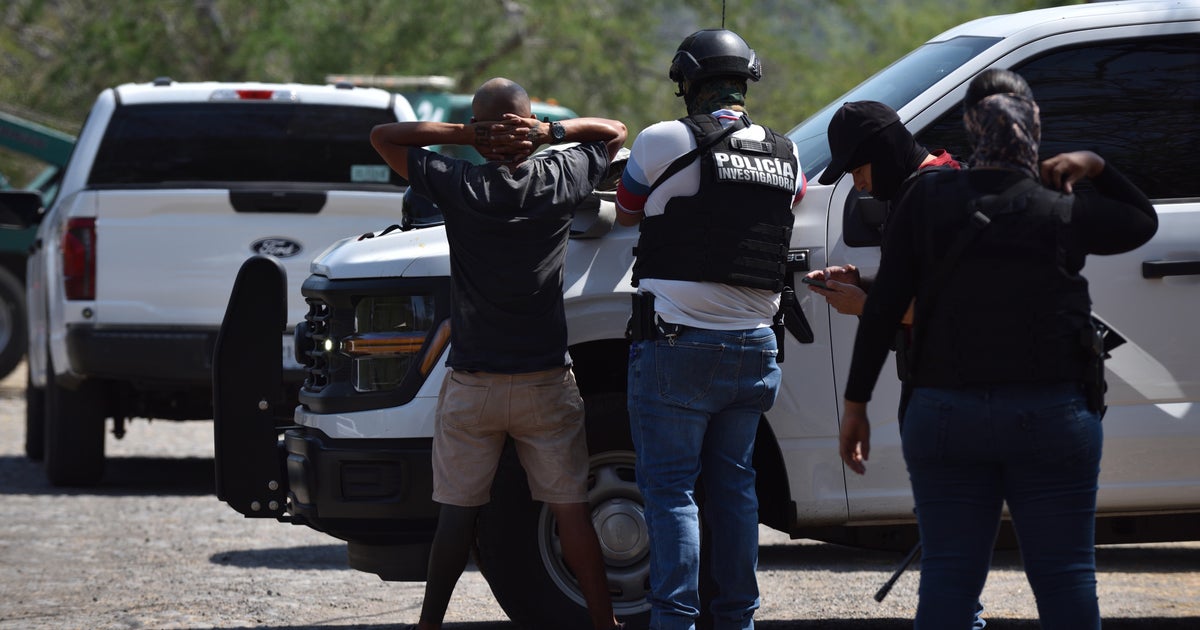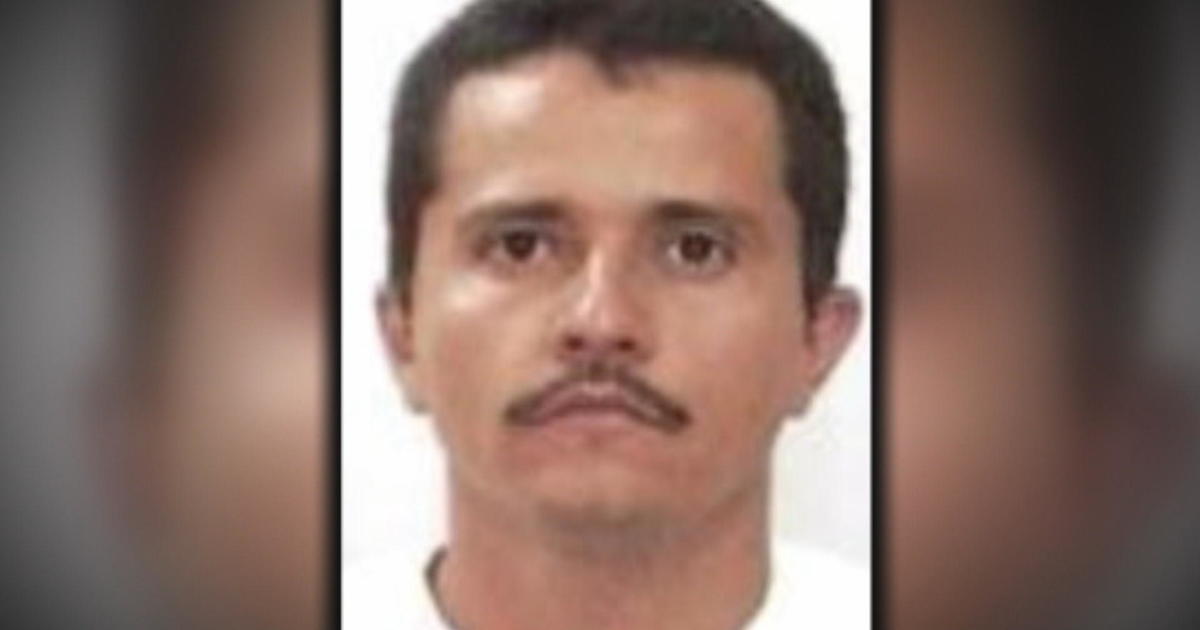General Igor Kirillov, head of Russia's biological, chemical forces, killed in Moscow blast claimed by Ukraine
The head of the Russian military's biological and chemical weapons unit, Lt. General Igor Kirillov, was killed along with his deputy early Tuesday in an explosion in Moscow, Russia's Investigative Committee said. Ukrainian security sources told CBS News the Security Service of Ukraine (SBU) killed Kirillov in a special operation. The claim couldn't be independently verified, but Russian officials quickly vowed to take revenge against Ukraine's leaders.
The sources said a scooter with explosives was detonated near Kirillov and his assistant outside an apartment building in the Russian capital. Video circulating online appeared to show the two men exiting a building right before an electric scooter parked near the entrance blew up.
"Kirillov was a war criminal and an absolutely legitimate target, since he gave orders to use prohibited chemical weapons against the Ukrainian military," an informed source in the SBU asserted to CBS News. "Such an inglorious end awaits everyone who kills Ukrainians. Retribution for war crimes is inevitable."
The deputy chairman of Russia's Security Council, Dmitry Medvedev, said Ukraine's leaders would face imminent revenge for the killing, Russia's RIA news agency reported.
The bomb was triggered remotely and had the power equivalent to roughly 300 grams of TNT, Russian state news agency Tass reported, citing unnamed sources in the emergency services.
"Investigators, forensic experts and operational services are working at the scene," said Svetlana Petrenko, a spokesperson for Russia's national Investigative Committee, in a statement. "Investigative and search activities are being carried out to establish all the circumstances around this crime."
She also said the Kremlin was treating it as a terrorist attack.
Kirillov and the unit he headed have been sanctioned by several countries, including the U.K., Canada and the U.S., for the use of chemical weapons in Ukraine.
Ukraine's SBU has said it recorded more than 4,800 occasions when Russia used chemical weapons on the battlefield since President Vladimir Putin launched his full-scale invasion in February 2022. In May, the U.S. State Department announced sanctions against Kirillov's unit, saying the U.S. had recorded the use of chloropicrin, a poison gas first deployed in World War I, against Ukrainian troops.
Kirillov, who had been in his post since April 2017, was also accused by the U.S. government of helping to spread disinformation about biological weapons and research.
In March 2023, about a year into Russia's full-scale invasion, the U.S. State Department said Kirillov had "significantly increased his media engagement" to issue repeated, baseless claims that the U.S. government had been involved in creating both the mpox virus and COVID-19, and that the U.S. "is developing biological weapons able to selectively target ethnic groups."
"The U.S. Government is concerned that this false narrative may be a prelude for a false-flag operation, where Russia itself uses biological, chemical, or nuclear weapons in Ukraine, and then attempts to blame it on Ukraine and/or the United States," the State Department said at the time.
Russia has denied using any chemical weapons in Ukraine and, in turn, has accused Kyiv of using toxic agents in combat.
Kirillov was sentenced in absentia by a Ukrainian court on Dec. 16 for the use of banned chemical weapons in Ukraine during Russia's military operation in Ukraine that started in Feb. 2022.
Almost three years into Russia's ongoing war, Russian troops have made small but steady advances, adding to the nearly one-fifth of Ukraine they already control.
Since Russia invaded, several prominent figures have been killed in targeted attacks believed to have been carried out by Ukraine.
Darya Dugina, a commentator on Russian TV channels and the daughter of Kremlin-linked nationalist ideologue Alexander Dugin, died in a 2022 car bombing that investigators suspected was aimed at her father.
Vladlen Tatarsky, a popular military blogger, died in April 2023, when a statuette given to him at a party in St. Petersburg exploded. A Russian woman, who said she presented the figurine on orders of a contact in Ukraine, was convicted and sentenced to 27 years in prison.
In December 2023, Illia Kiva, a former pro-Moscow Ukrainian lawmaker who fled to Russia, was shot and killed near Moscow. The Ukrainian military intelligence lauded the killing, warning that other "traitors of Ukraine" would share the same fate.
On Dec. 9, a bomb planted under a car in the Russian-occupied Ukrainian city of Donetsk killed Sergei Yevsyukov, the former head of the Olenivka Prison where dozens of Ukrainian prisoners of war died in a missile strike in July 2022. One other person was injured in the blast. Russian authorities said they detained a suspect in the attack.
Editor's note: This article has been updated to reflect that the Russian military unit previously headed by Kirillov does not control the country's nuclear weapons, as previously stated, but only its biological and chemical weapons.





